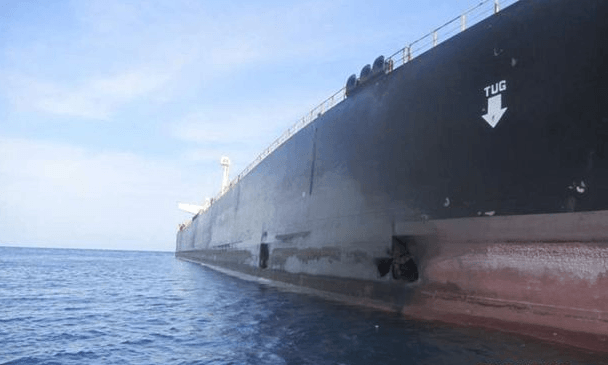
Iranian tankers have been targeted in the Red Sea three times in a six-month period, the Islamic Republic said last week, warning the international community the shipping route was unsafe.
Just one of the three incidents, an October 11 missile attack off Saudi Arabia’s coast, had previously been reported.
The other two involved the Happiness 1 in April, which saw “engine failure and loss of control” and the Helm in August, which suffered unspecified “technical issues,” the Wall Street Journal reported Wednesday, citing an Iranian government letter to the International Maritime Organisation dated October 30.
All three attacks were reported to have taken place off the Saudi Arabian coast.
“We believe that this is an attack organised by one or more states, since two other Iranian flagged [very large] tankers were similarly attacked in the same approximate area” and with “ similar damages to the ships,” the Iranian letter said.
“A major concern in this respect is that the organised and directed pattern of these attacks within a short time and similar locations have rendered the Red Sea as an unsafe route for ships to adopt for their voyages,” it added.
The Happiness 1 was previously reported to have broken down in early May around the same location another Iranian tanker was later targeted in October. The ship was repaired in Saudi Arabia and held in the kingdom until July 21 when it was released. The rare docking came despite escalating tensions between staunch enemies Iran and Saudi Arabia.
Similarly, Iran said in August another oil tanker, the Helm, faced a technical failure while passing through the Red Sea, without elaborating.
In the October 11 strike, Iran said missiles hit one of its oil tankers traveling through the Red Sea off the coast of Saudi Arabia. The attack reportedly took place around 5 a.m. and damaged two storerooms aboard the oil tanker Sabiti, state media reported at the time. It also briefly caused an oil leak into the Red Sea near the Saudi port city of Jeddah that later was stopped, state-run IRNA news agency reported.
The Sabiti turned on its tracking devices later that day in the Red Sea, putting its location some 130 kilometers (80 miles) southwest of Jeddah, according to data from MarineTraffic.com. The ship was carrying some 1 million barrels of crude oil, according to an analysis from data firm Refinitiv.
“A government has definitely been involved in this,” Iran’s President Hassan Rouhani told a news conference in Tehran at the time. “It wasn’t an act by terrorists, by an individual, a group. It was done by a government.”
Tensions in the region have been high for months, following US President Donald Trump’s decision to impose crushing sanctions that target Iran’s crude oil sales and have crippled its economy. Those sanctions came after Trump unilaterally withdrew the US from Tehran’s nuclear deal with world powers last year.
Since May, there have been a series of oil tanker attacks near the Strait of Hormuz, the mouth of the Persian Gulf through which 20% of all oil passes. While Tehran denies being involved, the US Navy says Iran used magnetic mines on the vessels. The Navy released video it said showed Iranian Revolutionary Guard members taking an unexploded mine off one vessel, an incident still not explained by Tehran.
Iran meanwhile has shot down a US military surveillance drone and seized several oil tankers amid the heightened tensions. At the height of the crisis, Trump ordered retaliatory strikes against Iran after the Islamic republic downed the US drone but called them off at the last minute.
The United States has formed a naval coalition to escort commercial vessels through the Strait of Hormuz, the strategic chokepoint at the mouth the Gulf. It has been joined by Australia, Bahrain, Britain, Saudi Arabia and the United Arab Emirates.
The tensions culminated in a September 14 attack on key Saudi oil infrastructure, blamed on Iran, that halved the kingdom’s oil production.
Source: The Times Of Israel